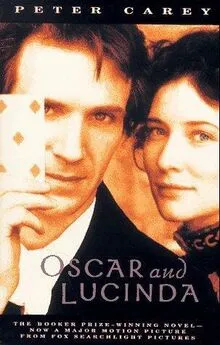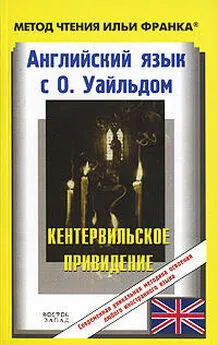Peter Carey - Oscar and Lucinda
- Название:Oscar and Lucinda
- Автор:
- Жанр:
- Издательство:Vintage Books
- Год:1988
- Город:New York
- ISBN:0-679-77750-4
- Рейтинг:
- Избранное:Добавить в избранное
-
Отзывы:
-
Ваша оценка:
Peter Carey - Oscar and Lucinda краткое содержание
The Booker Prize-winning novel-now a major motion picture from Fox Searchlight Pictures.
This sweeping, irrepressibly inventive novel, is a romance, but a romance of the sort that could only take place in nineteenth-century Australia. For only on that sprawling continent-a haven for misfits of both the animal and human kingdoms-could a nervous Anglican minister who gambles on the instructions of the Divine become allied with a teenaged heiress who buys a glassworks to help liberate her sex. And only the prodigious imagination of Peter Carey could implicate Oscar and Lucinda in a narrative of love and commerce, religion and colonialism, that culminates in a half-mad expedition to transport a glass church across the Outback.
Oscar and Lucinda - читать онлайн бесплатно полную версию (весь текст целиком)
Интервал:
Закладка:
"Don't ask me, guv. It's all writ here."
"Ill take the rest, but not the rabbits."
"Sorry, guv, t'ain' either or. It's all or bleeding nothing." Lucinda walked amongst the cages: rabbits, pigeons, pheasants, all addressed to a body known as the Acclimatization Society of New South Wales. There were also deer, half a dozen does and three bucks, all the males in separate cages, and one of them already bleeding badly around the head. And lastly, there were llamas, standing still and wet, each one in a separate cage, all marked with stern signs forbidding any contact. Lucinda tried to pat a doe, but it pulled its head away sharply and, when she persisted, tried to bite her.
She turned to walk back to the first-class gangway. The rain was beginning to ease back to its more usual drizzle. An officer, done up in braid like an Italian, saluted her. There were fifty-five days to Sydney. Fifty-five days before she would know if Dennis Hasset had-she bit 169
Oscar and Lucinda
her lower lip and scrunched up her eyes-married Harriet Borrodaile or Elizabeth Palmer. His letters had mentioned "the most appalling dances" but she did not trust the description. Dear God, let him still be a bachelor, not that I might marry him, but that he may be my friend. Dear God, please leave me someone with whom I can talk.
The rain started again, heavily, and the gangway ahead would not clear. She lifted her umbrella to see properly, peering up from the fourth step. It would appear that there were problems with an invalid. She recognized the red-haired clergyman as the one who had arrived in a hansom, or, rather, recognized the hair. It was he who was the invalid. She thought it strange they should carry a man backwards up a gangplank. But then, as she watched, she saw they were no longer going up, but coming down. And this was how she first saw Oscar, although there was not a lot to see because he had his hands pressed to his face.
The Reverend Oscar Hopkins was carried, moaning, backwards, off the Leviathan. The Reverend Ian Wardley-Fish carried the stretcher at the end where his feet were, and the Reverend Hugh Stratton, in spite of his bad back, carried the other. There were also, in this entourage, Mrs Stratton, Melody Clutterbuck, and Theophilus Hopkins, a bleakfaced old man whose eyebrows needed trimming; he carried a box full of soldering implements he had made especially for his son.
As Lucinda watched, the red-haired clergyman was blindfolded.
The handsome one with the blond beard clapped his hands together. The red-haired one was still moaning. The blond-bearded one said: "Speed. We need speed, Hopkins. That will do the trick." Then he clapped his hands together again, and gazed around like a man looking for a stick to kill a snake. He was quite drenched.
The old man with the grey-streaked beard held his gift like a sodden magus who has arrived at a disappointing destination. "Surely," he said, fiddling with the neck button of his oilskin, "surely, Oscar, you can walk?"
A large frowsy blonde woman with a loud Oxbridge voice and an enormous bosom now came forward and began to tug at the old man's coat. "Come," she said, "come, we shall go aboard." Lucinda pushed past and got on to the gangway before they could cause any more trouble. She found the English tiresome in the extreme. She acknowledged one more ostentatious salute and hurried to her stateroom. She left her umbrella dripping by the door, took off her hat, unlaced her boots, and then, with nothing on her feet but stockings, sat at the little bureau and tried to write in her journal.
170
Babylon
For all the things that had happened to her, all the people she had met, the miles of ocean she had covered, she could feel nothing worth writing except: "An exceedingly grand apartment which I spoil by the excess of irritation and agitation I carry with me everywhere. Would dearly love cribbage."
She heard the crane's donkey engine. She leaned forward, to see if she might catch a glimpse of one more cow, when a large cage swung past the porthole, so close she involuntarily flinched. In the cage were three clergymen, the blindfolded one, looking quite green, squatted in the middle. His mouth was open. She could not hear what noise he made. The older clergyman (he looked like an aged boy) held the blindfolded one's arms. He looked very still and very pale and his mouth was shut. But the blond one with the mole was all animation. His hands were raised. His eyes were dancing. He looked as though he would shortly spring into the air. Lucinda could hear him quite distinctly.
"In a trice," he shouted, "I told you, Hopkins-in a trice." 47 Babylon
The saloons and cabins of the Leviathan were lofty and ornate. There was carving, scrollwork, plush. The grand saloon, in which Lucinda Leplastrier stood, quite alone, was almost three times her height, was sixty-two feet long and thirty-six feet wide. Two great funnels passed through this room but were covered with eight panels, four larger ones, which were mirrors, and four smaller ones, ornamented with paintings of children and emblems of the sea. There were couches upholstered in red plush, settees in Utrecht velvet, a carved mahogany organ, buffets and tables of elegantly carved walnut, arabesque panels filled with sentimental paintings. There were Brussels carpets on the floor and-those items Wardley-Fish had selected as somehow expressing
Oscar and Lucinda
the quintessential nature of the Leviathan's unseemly opulence portières of carmine silk. One could lean across the rail of the grand saloon as Lucinda did now, and gaze down into the second-class promenade. And whilst it is true that Mr Ishmael Kingdom Legare had not been quite so lavish there, he had, just the same, been generous with comfort and with space and if brutal iron girders crossed the ceiling of second classthey were also sympathetically decorated (after an oriental theme), being painted blue and red alternatively, the underside edged with gilt and the spaces between the beams divided into panels which were very lightly decorated in colour and gold.
Lucinda looked down at the second class and liked it better than the place she was in. She thought: I have done it again.
She had wasted money to be in a place whose privileges she somehow had imagined herself
"entitled" to, but once she had been robbed of the extra fifteen pounds involved, the privilege would only serve to make her feel squeezed and constricted and her voice would sound coarse, not just to others, perhaps not to others at all, but to herself. She could not imagine how anyone with warm blood in their veins could feel at home amongst the cool and polished distances in first class. She had pretended to herself that she was one of them, but she was not. And so she imagined that she would be much more at home in second class. She liked the way the secondclass cabins-they were in two tiers, like little terraces, one up, one down-all opened on to this central space, and she, conscious of her very public lack of wellwishers, was much attracted by the knot of people in second class; they were clustered around the men who had arrived by cage. It was not just curiosity made her wish to be amongst them, but something stronger, more physical, a need to push herself in amongst her kind, like a Derby hog or a rabbit in a cage. The crowd milling around the clergymen had increased since she had seen it at the gangplank. There were schoolboys. There had been four, but now there were three. These three were making a presentation of a memorial scroll to the red-headed clergyman who made a small speech in return. He moved his hands much when he spoke. He blew his nose. There was applause. There was a broad-shouldered man with a heavy beard-not a clergyman, but obviously a pedagoguewho shepherded the boys into one corner and arranged for them to have tea and cake. The fourth boy returned at this time. She wondered who was travelling and who staying. She considered, once again, transferring her baggage down to a second-class cabin, but faced with the bored
Babylon
and supercilious expressions of the stewards, did not have the energy. The red-headed clergyman was escorting the old man with the dark beard (his father, surely?), taking him from point to point around the second-class promenade, gesturing excitedly like a young artist at last admitted to the Royal Academy and the old man, excessively careful in his steps, was playing the part of the proud and newly frail. The younger woman of the party arranged herself (carefully, for she was fashionably dressed) on a velvet sofa, pressed her hands to her eyes, then looked up. Lucinda saw her smile, and returned it, not understanding that what she had thought was a smile was in reality a grimace.
Melody Clutterbuck-it was she who had grimaced-was almost sick with the embarrassment of being there. She was ill at ease and out of place. She was cowed by the ship, and yet it was not the ship that did it to her for she would not have felt like this in any other cornpany. Had she been here alone with Ian it would have been quite different, or with her father, or almost anyone she knew. But she was, by blind and unjust circumstances, forced into company with those for whom this ship was not intended and she was, therefore, one of them. She did not know which of her companions was the worst. They were an ensemble; their performance was too grotesque to be contemplated. There were, for instance, the Strattons, a type all too familiar to Melody Clutterbuck. She had observed their fellows at the dinner table of her father, the Bishop, since her earliest childhood. They smelled of dust and sherry and had shiny patches on their garments; the male had slippery eyes which could not hold the gaze a second; the female had great opinions and was noisy with her cutlery; they had what could be most politely termed "hearty" manners. The Strattons displayed all the characteristics of their caste. They leaned forward over plates of buns which had been made with the intention of amusing children. When they had their mouths full, for that brief period when further biting was impossible, they cast eyes around like clerks from Sotheby's come to value furniture. They were grubby, of course, but it was not a grubbiness you could detect at a distance. It was there so deep within their fabrics that you might think it part of them, as indeed it was. They had cultured voices, and it was this last part, the contrast between how they sounded and how they looked, that made them so disturbing. But these were the cream of her present society. They, at least, had precedents in her world. They were "types" and even if they were irritating, they also had a set place in the menagerie of life. But Oscar-Oscar made her flesh crawl and her hands dig into each other. Fingernail
Oscar and Lucinda
attacked flesh as if it might therefore create enough confusion in the brain, and with this smokescreen of pain block out of the other larger pain. She cound not bear the bony triangle of head. As a triangle it was far too long. The mouth occupied too small a space. The hair was quite beyond belief. He had a faint moustache now, but it was so feeble one wished to inform him there was no point persisting. She had a list. A long list. She could not, for instance, bear his fluting voice, his frightful flapping hands, his total insensitivity to how she felt about him which allowed him, in spite of everything, to bestow on her the most beneficent smiles. Even the way he ordered cocoa from the steward was, in the middle of this precise luxury, naïve to the point of idiocy. The stewards, it was easy to see, were the most frightful little snobs and Melody Clutterbuck sympathized with them (she also judged themthey were only stewards) when they saw the type of person they would be called upon to serve. In first class, she presumed, one would not be so embarrassed. She looked up at the lady in first class, made a little grimace, and was pleased to receive one in return.
Читать дальшеИнтервал:
Закладка:









